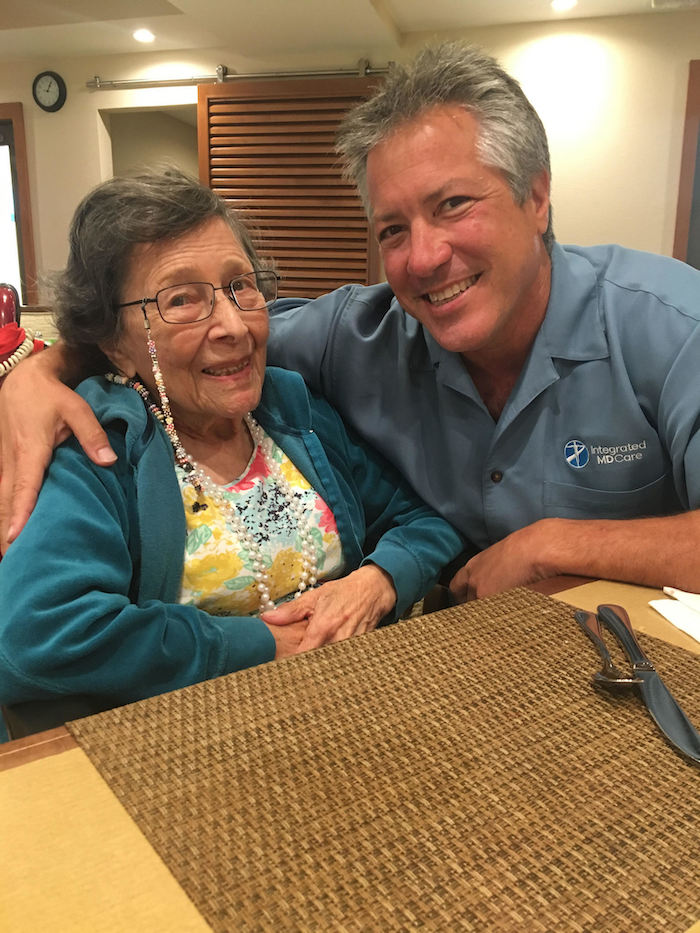
By Joe Tash
Dr. Bob Uslander’s No. 1 goal is to provide people who are in the final stage of life with a “soft landing.”
To Uslander, who runs a Del Mar-based medical practice, that means focusing on patients’ dignity, quality of life, and peace of mind as they approach their final days.
A former emergency room doctor, Uslander said he launched his practice – Integrated MD Care – about three years ago after noticing gaps in the health care system, particularly when it comes to caring for elderly patients and those with serious illnesses.
His solution was a model for delivering health care that creates a deep connection between caregivers, patients and their family members. The care team includes a doctor, nurses and therapists, and works with patients in their homes.
While the health care system, including palliative and hospice care, is very compassionate and works to make patients comfortable as their lives end, said Uslander, what’s missing is someone talking to them about their options for their final days, and how they want to experience their end of life.
“No one is talking to them about how they want to die, and what they want that experience to be,” Uslander said. “They miss the opportunity to have a truly empowered, transformational and meaningful end-of-life experience. The conversations aren’t happening.”
Before launching his practice, Uslander said he set out to research end-of-life care and see what was available What he found was a gap in the health care system, which he is trying to fill. He said he is not aware of any other practice like his.
“We’ve proven the model, that it works,” said Uslander, noting that he has seen the results in the improved quality of life for patients and their families.
In 2017, Uslander began caring for Jane Gillenwaters of La Costa, who suffered from pulmonary fibrosis, a condition that left her wracked with coughing spasms, gasping for air.
Jane’s husband of 62 years, Ed Gillenwaters, said the family watched as Jane deteriorated and lived with fear, anxiety and discomfort, knowing there was no cure for her illness.
Uslander took over her care in the final weeks of Jane’s life, and there was an immediate change. Not only did Uslander make changes that left her more physically comfortable, such as finding her a new, more effective machine to dispense oxygen, and taking her off of medications that weren’t helping, but he also talked to her about her end-of-life options and listened to what she had to say.
“His care restored her personal dignity. The more she talked about what she was thinking and feeling the more relaxed she became,” Gillenwaters said. “What he did was set her free from terrible fear and anxiety that is too often associated with impending death.”
The change in Jane’s outlook in turn lifted a “crushing emotional burden” from her husband and children, said Gillenwaters. When she died, Gillenwaters said, she was relaxed and peaceful, and no longer struggling for each breath.
Uslander has assembled a team of nurses, doctors, social workers and therapists, who can offer a range of services depending on the needs and desires of patients. Those services might include massage or music therapy, nutrition assistance or acupuncture.
The practice is considered a concierge service, said Uslander, meaning that doctors and nurses are available by phone on a 24/7 basis.
Patients pay a monthly fee ranging from several hundred to several thousand dollars, depending on their specific needs. The practice does not accept insurance, because Uslander said, “the low reimbursement and onerous administrative burden reduces the ability to provide excellent care.”
Because his practice is privately run, said Uslander, he has the option of reducing or waiving fees where appropriate. He’s also launched a nonprofit, the Integrated Lifecare Foundation, to provide education and raise money to pay for end-of-life care for those who can’t afford it.
Gillenwaters said he was so impressed by the care provided for his wife that he has since joined the foundation’s board of directors.
“Families need to know that such an approach is available to make the ending of loved ones’ lives comfortable and dignified,” Gillenwaters said.
For those interested in learning more about Uslander’s care and treatment model, he is scheduled to give a talk from 6 to 7:30 p.m. on Tuesday, Jan. 8, at the Solana Beach Library, 157 Stevens Ave., Solana Beach. More information can also be found on his website, integratedmdcare.com.
Complete Article ↪HERE↩!





